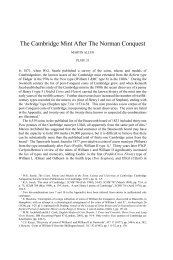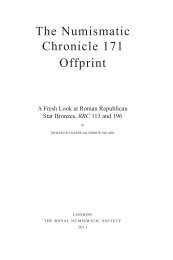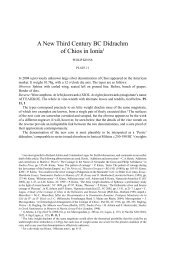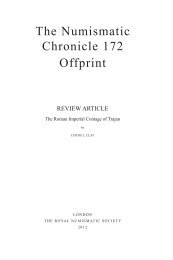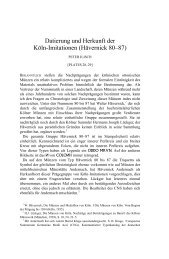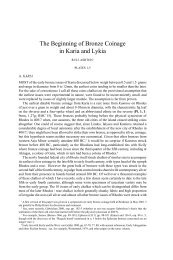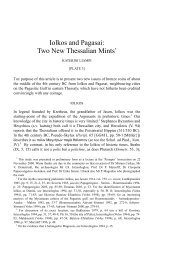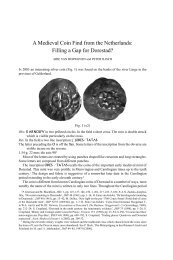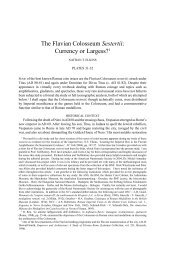The Numismatic Chronicle 171 Offprint - Royal Numismatic Society
The Numismatic Chronicle 171 Offprint - Royal Numismatic Society
The Numismatic Chronicle 171 Offprint - Royal Numismatic Society
You also want an ePaper? Increase the reach of your titles
YUMPU automatically turns print PDFs into web optimized ePapers that Google loves.
402<br />
FRANÇOIS THIERRY<br />
metropolitan examination was organised during the Gia Long era. 243 Indeed, they<br />
were not re-established until 1821 during the Minh Mạng era. In 1803 the Imperial<br />
College was moved from Thăng Long to Huê, and in 1821 this establishment was<br />
expanded. In 1824, to the dismay of scholars in the North, the Vice Minister of<br />
Rites, Hoàng Kim Hoán, was appointed rector of the College. He lacked formal<br />
qualifi cations, but was appointed because of his loyalty to the imperial family and<br />
because he came from the Huê region. Eventually, in 1827, most of the library of the<br />
Temple of Literature of Thăng Long, the former site of the College, was transferred<br />
to the new College in Huê. 244 It was therefore to assert himself ideologically and<br />
culturally that the fi rst emperor of this dynasty (and especially his successor) presented<br />
himself as an uncompromising promoter of the most rigorous form of Confucian<br />
orthodoxy, organised the civil service examination system modelled strictly on the<br />
Chinese system, built Confucian temples throughout the country, edited the classics<br />
writtten in Chinese and in nôm, and promoted studies of the Books and Canons, and<br />
of the commentaries by Zhu Xi and Zhen Yi in preparation for the examinations.<br />
In 1825, during the Minh Mạng era, for the fi rst and only time in Vietnamese<br />
history, the personal name of Confucius was affected by the ritual prohibition of<br />
taboo (Ch. Kong Qiu 孔丘, where Kong is the family name, and Qiu is the given<br />
name). Qiu now had to be pronounced in Vietnamese as kỳ and not as khâu, and it was<br />
to be written as 邱. <strong>The</strong> emperor declared ‘this prohibition demonstrates our respect<br />
for the Master and his way’. 245 It was in this context of ideological oneupmanship<br />
that the coins with moral maxims were produced.<br />
<strong>The</strong> coins issued during the Tự Đức era were made in clear response to a particular<br />
moment in the political history of the dynasty: that of the confl ict between the emperor<br />
and the educated class (văn thân 文紳), which formed the backbone of a society<br />
founded on Confucianism. <strong>The</strong> Tự Đức era, contrary to that of its predecessors, was<br />
marked by a serious crisis of legitimacy: in 1848 the emperor came to the throne<br />
thanks to the actions of the clan which had swept aside the oldest son of Thiệu<br />
Trị, the prince Hồng Bảo. Although they were brothers, in 1854 the emperor had<br />
Hồng Bảo executed. In 1862, when signing the Treaty of Saïgon with the French, the<br />
emperor committed a double fault by ceding to the demands favouring Christians<br />
and by agreeing to release some of his country’s land to the ‘barbarians’. 246 In 1866,<br />
the son of Hồng Bảo, prince Đinh Đạo, was also executed, after conspirators had<br />
243 <strong>The</strong> descendants of the loyal companions of Nguyễn Phúc Anh (the future emperor Gia Long)<br />
during his fl ight and his errancy during the Tây Sơn period, were, by imperial decree, awarded offi cial<br />
charges or positions over fi ve generations, see Laborde, ‘Les Titres et grades héréditaires à la cour<br />
d’Annam’, pp. 400–1.<br />
244 Poisson, Mandarins et subalternes, pp. 129–30. As a result of this policy, a number of private<br />
colleges were opened by literati in Thăng Long in the years 1820–35, the most well-known of which<br />
was that of Pham Quý Thích (1760–1825).<br />
245 Ngô DT, p. 325.<br />
246 <strong>The</strong> Vietnamese Court was clearly conscious of the enormity of the disaster because the clauses<br />
of the Treaty were kept secret; it was only two years later, during the 1864 examination session, that<br />
they became known by the candidates and the people, at which point a great surge of indignation swept<br />
over the country and especially through the North. Taking advantage of this situation, Prince Hồng Tât<br />
attempted a coup d’etat on 3 August 1864.



